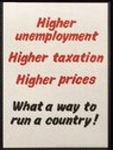Taxation to Revolution
Question

What taxes were the colonists required to pay by the British around the years 1760-1776?
Answer
After British victory in the Seven Years War (1756-1763), Parliament attempted to better organize the British Empire. Among other things, Parliament, led by the ministry of George Grenville, enacted the Sugar Act of 1764 and the Stamp Act of 1765, and so for the first time taxed the British North American colonies. The Sugar Act amended the Molasses Act of 1733 by lowering the duty on French West Indian molasses from 6d per gallon to 3d. Reducing the duty made purchase affordable and so encouraged what the higher duty had discouraged.
The colonists denounced the Sugar Act. They reasoned that British subjects had a sacrosanct right to have their property protected. The power to tax threatened property unless the taxing body was chosen by the tax payers and also had to pay the same taxes it required others to pay. The British House of Commons met neither requirement when it taxed the colonies, and so the colonists concluded that taxation without representation violated property rights.
The colonists made the same argument in response to the Stamp Act. But the Sugar Act was enforced primarily on the oceans and by the navy, meaning that the colonists could not physically prevent the tax from being assessed. The stamp tax required that to be legal most paper products—newspapers, court documents, marriage licenses, wills, even playing cards and dice—carry an official stamp. To work the tax depended on colonists within colonial communities selling the stamps, making suspected stamp distributors vulnerable to the pressure of their neighbors. The Grenville ministry announced the stamp tax in February 1765 to go into effect in November. In the intervening months the colonists protested, rioted, and intimidated anyone suspected of taking the office of stamp distributor. Led by the Sons of Liberty, the colonists made the Stamp Act unenforceable before it even began. In 1766 the new Rockingham ministry repealed the Stamp Act but only amended the Sugar Act lowering the duty to 1d per gallon. The experience showed that the colonists opposed all parliamentary taxation but that they could much more easily prevent internal taxes than external ones.
The Chatham ministry came to power in 1767 and enacted new taxes, the Townshend Acts, that year. These external taxes taxed lead, glass, paint, and especially tea. The Townshend Acts provoked the same ideological criticism and led colonists to have grave concerns that British liberty was not safe within the empire. Because the taxes were external they were much harder to prevent but by 1769 the colonists had organized a boycott movement. Growing tensions caused troops stationed on the western frontier to be reassigned to Boston, which led to the famous Boston Massacre on March 5, 1770. The new first minister, Lord North, had already decided to repeal most of the Townshend Acts, which were threatening to tear apart the empire.
In 1770 North repealed all of the acts except for the tax on tea, the most lucrative of the taxes. The remaining tax kept relations tense and suspicious. Finally in 1773 North sought to resolve the impasse. He replaced the last Townshend Act with the Tea Act of 1773. The act was meant to bail out the East India Company, make clear Parliament’s authority to tax the colonies, and make the price of tea cheaper for colonists than it had been before. North reasoned that no colonists could fear an act that made them drink cheaper tea. He was wrong and the Boston Sons of Liberty threw 342 chests of tea into Boston Harbor on December 16, 1773. The Boston Tea Party destroyed tea worth £11,000 or about $1.5 million today. That was the last tax Parliament ever imposed in the colonies. The Tea Party caused the passage of the Coercive Acts of 1774, which were punitive laws meant to punish Massachusetts, but were not taxes. The Coercive Acts led to the first and second Continental Congresses and, ultimately, to the declaration of independence. So taxes did not cause the American Revolution, but taxation without representation did create a climate of suspicion and fear that provoked the events which did.
For more information
Carp, Benjamin. Defiance of the Patriots: The Boston Tea Party and the Making of America, first edition. New Haven: Yale University Press, 2010.
Jensen, Merill. The Founding of a Nation, A History of the American Revolution 1763-1776 Oxford: Oxford University Press, 1968.
Bibliography
Maier, Pauline. From Resistance to Revolution: Colonial Radicals and the Development of Opposition to Britain, 1765-1776. New York: W. W. Norton & Company, 1992.
Morgan, Helen and Edmund S. Morgan. The Stamp Act Crisis: Prologue to Revolution Chapel Hill: The University of North Carolina Press, 1995.
Thomas, P.D.G. (Peter). Townshend Duties Crisis: The Second Phase of the American Revolution, 1767-1773 Claredon Press, Oxford University Press, 1987.
